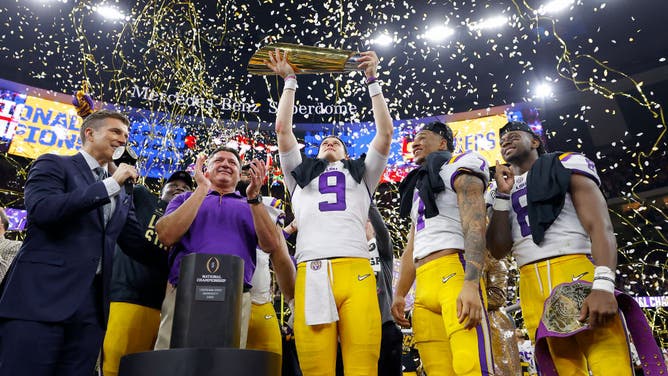Myles Brennan Injury Reveals Massive NIL Blind Spot
Redshirt junior quarterback Myles Brennan was looking like the presumptive favorite to start for LSU this fall, before suffering an arm injury yesterday that will require surgery. Despite playing in only three games last season, many local Bayou businesses were already coronating the Bay St. Louis product by throwing NIL money at him left and right. Brennan certainly won’t be the last high profile player to miss time due to injury, so his abrupt change in situation may serve as a cautionary tale to sponsors amidst this perceived gold rush of name, image, and likeness.
To have this conversation in a meaningful way, we must abandon the morality aspect that so many writers and fans cling to: ‘players deserve this money, just like any other adult making a living. Have you seen how much the NCAA makes?’ The argument, while true, often misses some greater nuances that deserve attention.
Instead, let’s start viewing the issue through the lens of marketing and advertising, which, if we’re being honest, is the driving motor behind anything the players will earn (besides a few autograph bucks here and there). The problem with throwing money at college athletes, as opposed to professionals or other types of media influencers like actors, is that the kids haven't yet earned the ability to sway audiences in an impactful way. College is their proving grounds, a place for the cream to rise to the top, at which point consumers recognize their uniqueness and therefore make subconscious decisions based on their influence. Local businesses will try to cash in on the local Friday Night Lights-esque mystique of hometown heroes, but a massive blind spot exists that skilled marketing pros will see coming from a mile away.

(Photo by Kevin C. Cox/Getty Images)
Again, we’re not taking personal shots here or dancing on any graves, just giving an honest business assessment of the pitfalls of NIL from an advertiser’s perspective. The plain fact of the matter is that many college prospects just aren’t going to have 'Joe Burrow' seasons where they defy all odds and become national heroes. Many college athletes, even the ‘can’t-miss’ five stars, will have decent collegiate careers, but nothing special. They may be plagued by injuries, coaching carousels, flukie seasons, or any other number of bad breaks that athletes face. They'll get a shot in the pro leagues, but may flame out in a few years. The stars in any sport are rare, which is why they are compensated accordingly.
Conversely, the reason that professional athletes make for better spokespeople is that they’ve proven themselves to be able to navigate the proving grounds of life and come out as one of the chosen few capable of playing at the highest level. The same goes for established actors or musicians: they may be insufferable people, but they have successfully navigated the world’s most cutthroat business and leveraged a mystique that consumers wish that they themselves, too, possessed.
Can Myles Brennan or Alabama quarterback Bryce Young (who reportedly made close to seven figures without taking a single starter snap) inspire consumers to make purchases with nothing more than a blessing from their coaching staffs? Apparently some people think so. And that’s the way this process will have to unfold many times in the future. Right now, people are betting on horses that haven’t run many races. Unless a generational talent like Trevor Lawrence comes around, who peaks early and then plays a few more seasons as king of the world, waiting for NFL eligibility to kick in, we’re going to see lots of deals from advertisers based entirely on potential instead of production, with hopes that their investment pays off in a meaningful way.

(Photo by Ralph Freso/Getty Images)
So far, most of the NIL deals have remained fairly small, which suggests that corporate marketing teams also feel hesitant to invest in such unknown products. But the money and perks being thrown around at prospects aren't insignificant: Brennan’s team had already inked five separate deals (GameCoin, Raising Canes, Smoothie King, and Smalls Sliders), with news of a brand new truck deal from a local Ford dealership coming out just hours before his injury. For perspective, the New Orleans Saints are a near-religion in the Bayou, but that Ford dealership decided to give away a brand new truck to the local college kid with heroic dreams instead of a proven commodity in the form of a pro athlete down the road. Same sport, same significance, but different angle. The situation certainly speaks to the power of college athletics in college towns, but also highlights the massive risks that advertisers face by trying to subvert a proven system of likeness deals that has been perfected over the last century.
Ardent supporters of NIL would see this situation as a victory—a college kid was able to ‘insure’ himself a bit against injury with some payouts—and I wouldn’t disagree. If the local burger joints want to prop up their local stars, then I’m all for it. As always, I’m just advocating thoughtfulness and big-picture nuance when it comes to discussions surrounding massive changes in sporting landscapes. So often we just pull the trigger on decisions and let the chips fall where they may. If more and more of these lottery ticket investments end up being duds, there will actually be less interest in NIL from deep-pocketed investors in the future. The more college sports becomes just one cheap commercial after another, the greater the chance that the overall product that we’ve all come to love becomes denigrated or diluted. A few ‘chosen’ kids becoming millionaires before earning anything on the field isn’t sustainable and will likely cause more long-term damage than good to all kids vying for a little something on the side. It will be interesting to see how it all unfolds.